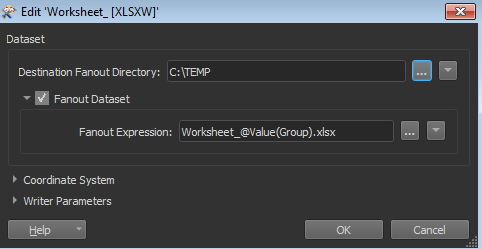Solved
Is there a way to limit the size of Microsoft Excel Spreadsheets to say 250 Rows, so that the Writer ends up spitting out multiple Spreadsheets for Work Packages that you can then assign to members of a team?
Is there a way to limit the size of Microsoft Excel Spreadsheets to say 250 Rows, so that the Writer ends up spitting out multiple Spreadsheets for Work Packages that you can then assign to members of a team?
Best answer by ebygomm
Hi,
Could you elaborate a little further with this example. Unfortunately I am not vey familiar with using SQL.
- Do I create this using the Expression Evaluator Transformer or Attribute Creator Transformer?
- @Evaluate what is the function of this?
- In the above example @Evaluate(@floor(@Value(_count)/250)) are you grouping by the floor attribute (e.g. 1st floor, 2nd floor)?
Thanks
- You can use either an Expression Evalutor or an AttributeCreator to create the Group attribute
- @Evaluate in an AttributeCreator means it performs an arithmetic expression rather than a text expression, you wouldn't need this in an expression evaluator
- The expression is dividing the count by 250, then @floor effectively rounds down to the nearest whole number, e.g. 5/250 = 0.02 , @floor rounds this down to 0 so the group attribute is 0. 250/250 = 1 so the group becomes 1, 300/250 = 1.4, @floor rounds down to 1 so the group attribute is 1 etc.,

This post is closed to further activity.
It may be an old question, an answered question, an implemented idea, or a notification-only post.
Please check post dates before relying on any information in a question or answer.
For follow-up or related questions, please post a new question or idea.
If there is a genuine update to be made, please contact us and request that the post is reopened.
It may be an old question, an answered question, an implemented idea, or a notification-only post.
Please check post dates before relying on any information in a question or answer.
For follow-up or related questions, please post a new question or idea.
If there is a genuine update to be made, please contact us and request that the post is reopened.




